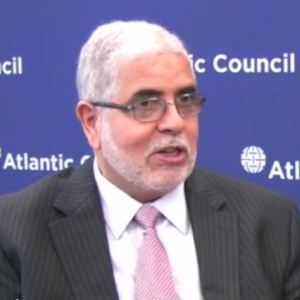Karim Mezran, senior fellow with the Rafik Hariri Center, sat down with Dr. Mustafa Abushagur, former interim Libyan deputy prime minister, to ask him questions on September 12 regarding the most pertinent issues facing Libya’s transition to democracy.
In discussing what was done right or wrong in the transition to date, Dr. Abushagur urged to put Libya’s into context—facing the challenge of implementing a democracy program while grappling with frozen assets, a lack of capacity, civil unrest, and a paralysis in domestic oil output. Nonetheless, the al-Keib government succeeded in holding elections on time and taking measures to ensure government transparency hitherto unseen in Libya. Building the armed forces, however, proved more difficult due to the complexity of armed groups and divided loyalties. The lack of reconstruction and development shortly after the revolution was tied to the lack of liquidity, corruption, and capacity.
Dr. Mezran also asked Dr. Abushagur about the state of the constitutional drafting process in Libya, who felt that the General National Congress took too long to decide on the electoral system and lamented the lack of dialogue in the country surrounding other major issues concerning the constitution. Mezran argued that a national dialogue might provide an avenue to tackle divisive subjects in the constitution. Abushagur agreed but that the dialogue however needed to be inclusive to all sectors of society.
With regard to US engagement, Dr. Abushagur described how Libyans have felt that the United States is standing aside to watch how Libya unfolds rather than playing a proactive role in providing assistance. While European engagement has been encouraging in terms of border security, he argued for balanced multilateral assistance from all international partners to help develop a model for democracy and post-conflict reconstruction in Libya.
